A Diné prayer song captured in a hip-hop hit. A “tribal” design wrapped around a trendy duffel. Who owns these traditional and cultural expressions? How do they fit into our Western framework of intellectual property? How can we protect traditional knowledge without making it even more available for exploitation?
Those are the kinds of questions raised in the ongoing negotiations at the World Intellectual Property Organization (WIPO) Intergovernmental Committee on Intellectual Property and Genetic Resources, Traditional Knowledge and Folklore (IGC). The United States has been participating in these negotiations since 2000. Since 2009, the negotiations have centered on drafting text for three potential legal instruments concerning (1) Traditional Knowledge (TK), (2) Genetic Resources and Associated Traditional Knowledge (GRAATK), and (3) Traditional Cultural Expressions (TCE).
The US Department of State delegated authority for these negotiations to the U.S. Patent and Trademark Office (PTO), but the federal government has been slow to consult with Tribal Nations on this matter. At its 2016 Annual Convention, the National Congress of American Indians (NCAI) passed a resolution calling for such consultation. NARF represents NCAI in negotiations to protect indigenous peoples’ intellectual property through these developing international instruments.
2017
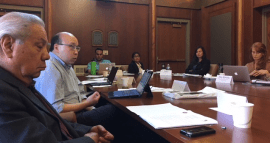
The PTO and other federal agencies conducted listening sessions with Tribes in 2017, and in May 2017, the Native American Rights Fund (NARF) and the University of Colorado Law School (Colorado Law) hosted a major drafting session on the WIPO TCE instrument. With NCAI’s approval, NARF took a proposed draft of new TCE provisions to the 34th WIPO session in Geneva, Switzerland, in June 2017. The WIPO Indigenous Caucus approved the draft and some of the text from it was introduced into the WIPO draft TCE instrument. NARF and NCAI continue to refine and promote the TCE instrument language, and have also turned their attention to the WIPO TK and GRAATK instruments. Another drafting session was held at Colorado Law in May 2018 to prepare for the IGC 36th session to be held in June 2018.
2018
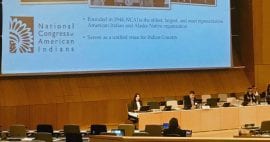
NARF Staff Attorney Sue Noe attended that 36th session and, on June 25, 2018, served as a speaker on the Indigenous Panel on the topic of “Practical Measures Relating to Intellectual Property and Genetic Resources: Databases and Contracts – Indigenous Peoples’ and Local Communities’ Perspectives.” Ms. Noe served on the opening Indigenous Panel, along with co-panelist Mr. Aleksey Tsykarev, Member and Former Chairperson-Rapporteur of the United Nations Expert Mechanism on the Rights of Indigenous Peoples, and her presentation dealt with specific examples and issues related to practical measures, such as databases and contracts, for the protection of indigenous peoples’ genetic resources and traditional knowledge.
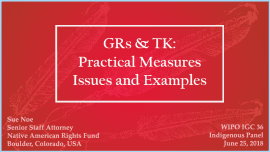
Specifically, Noe described some of the recent experiences of the Penobscot Nation and the Karuk Tribe, both of whom are actively working to protect their Tribes’ traditional knowledge, cultural heritage, and intellectual property rights.
The Penobscot Nation was one of the earliest U.S. Tribes working on intellectual property issues. It has established a governing body—the Penobscot Tribal Rights and Resources Protection Board that reviews, approves, and provides oversight for all research concerning the Tribe’s cultural heritage conducted by non-Tribal members. Most recently, in May 2018, the Penobscot Nation and the University of Maine signed an historic Memorandum of Understanding regarding the University’s research processes and Penobscot Nation intellectual property rights and rights of consultation related to Penobscot Nation cultural heritage in the University’s collections and publications.
Like the Penobscot Nation, the Karuk Tribe has also worked for decades on intellectual property and cultural heritage preservation efforts, collaborating with academic institutions to create a multi-faceted intellectual property toolkit that protects the Tribe’s resources and provides a framework for acceptable ways of sharing information. The Karuk Tribe has developed guiding principles that govern collaborations and research related to the Tribe. They include free, prior, and informed consent, confidentiality, self-determination, and other principles recognizing that the Tribe retains prior proprietary rights over its traditional knowledge and cultural and natural resources and that the Tribe is the primary legal and cultural custodian in any projects or activities that produce intellectual property products.
Ms. Noe emphasized that while practical measures can be useful tools for Tribes in seeking to protect their traditional knowledge and intellectual property rights, legal norms providing positive protections for indigenous peoples’ intellectual property rights—like the legal instruments under negotiation by the WIPO IGC—are imperative.
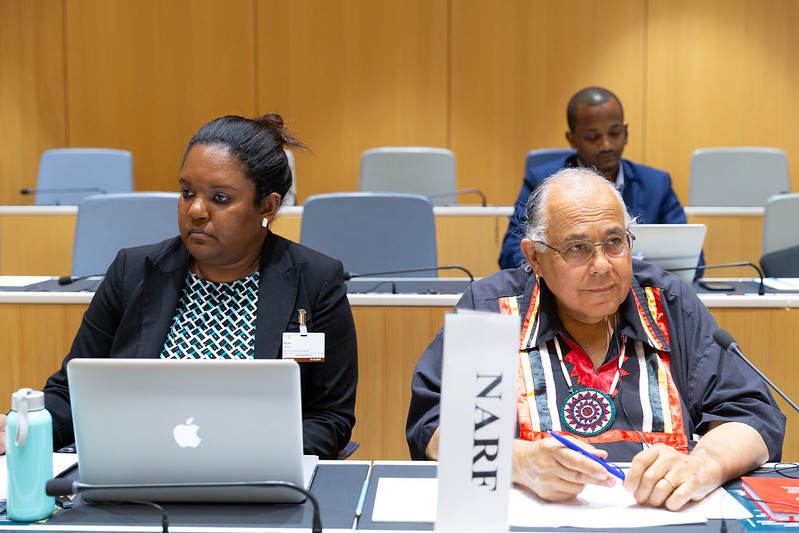
In late August 2018, Noe joined NCAI representative Frank Ettawageshik at the 37th IGC session, where Mr. Ettawageshik served as co-chair of the Indigenous Caucus. It was the first of four sessions to deal with Traditional Knowledge and Traditional Cultural Expressions.
2019
WIPO held the 40th session of the Intergovernmental Committee on Intellectual Property and Genetic Resources, Traditional Knowledge and Folklore (IGC 40) at WIPO headquarters in Geneva, Switzerland, June 17-21, 2019. NARF Staff Attorney Sue Noe was there representing the National Congress of American Indians (NCAI).
IGC’s objective is to reach an agreement on one or more intellectual property-related legal instruments for the protection of traditional knowledge (TK), traditional cultural expressions (TCEs), and genetic resources and associated TK (GRAATK). Text-based negotiations have been underway at the IGC since 2010. Presently there are three draft texts under negotiation, one on each subject matter.
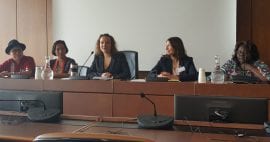
IGC 40 was the fourth in the series of sessions focused on the TK and TCEs draft texts. At the suggestion of the IGC Chair, IGC 40 looked at the scope of protection to be provided in the instruments and the potential exceptions and limitations to the protections that might be allowed. For example, negotiation issues included:
- when TK/TCEs should be protected, including a possible “tiered approach” which would provide differing levels of protection based on criteria such as whether the TK/TCEs are secret or sacred, or whether the information is widely or narrowly diffused geographically;
- whether indigenous peoples and local communities who are the holders of the TK/TCEs should have a mechanism for requesting higher levels of protection for TK/TCEs being used without their prior informed consent, regardless of how widely known or diffused the TK/TCEs have become; and
- under what circumstances protected TK/TCEs can be used – for example, for education and research purposes, or where necessary to protect the public interest – and the restrictions and requirements to be placed upon the development of any such exceptions and limitations to protection – for example, whether they should be developed in consultation with the holders of the TK/TCEs, and only be allowed if they will not unreasonably conflict with the TK/TCEs holders’ interests.
The meeting produced revised texts, which were approved by the Committee’s member states as the basis for future negotiations. However, the texts continue to include various alternative provisions reflecting member states’ differing positions on these and other issues.
The IGC operates on two-year mandates and because this meeting was the last session of the 2018-2019 biennium, IGC participants also had to negotiate a mandate and work program for the next biennium. Noe was selected by the Indigenous Caucus to represent the Caucus in small group negotiations with member states’ regional coordinators on the 2020-2021 mandate and work program. In this role, she was able to bring to the table recommendations to WIPO from the UN Permanent Forum on Indigenous Issues (UNPFII). At the 18th Session of the UNPFII in April 2019, which addressed the theme of “traditional knowledge,” Noe coordinated with other WIPO IGC Indigenous Caucus participants to request UNPFII make recommendations to WIPO related to the IGC negotiations.
Based on the UNPFII recommendations, IGC 40 recommended to the WIPO General Assembly that WIPO commission the updating by an indigenous expert of the Technical Review of Key Intellectual Property-related Issues of the WIPO Draft Instruments on Genetic Resources, Traditional Knowledge and Traditional Cultural Expressions, which was prepared by former UN Special Rapporteur on the Rights of Indigenous Peoples, James Anaya, in 2014. IGC 40 also recommended that WIPO organize an Indigenous Expert Workshop to take place during the 2020-2021 biennium. Additional work remains to be done on the UNPFII recommendation related to WIPO funding for Indigenous participation at the IGC negotiations.
2020
On September 10 and 24, 2020, the Native American Rights Fund, National Congress of American Indians, and Colorado Law presented Webinars on Indigenous Peoples & Intellectual Property for Indigenous Leaders, Lawyers, and Community Members. The webinars feature Indigenous experts and representatives from the U.S. Patent and Trademark Office and the World Intellectual Property Organization and were geared especially to Indigenous leaders, lawyers, and community members.
WEBINAR 1: OVERVIEW OF INTELLECTUAL PROPERTY LAW, INDIGENOUS PEOPLES’ TRADITIONAL KNOWLEDGE & TRADITIONAL CULTURAL EXPRESSIONS. SEPTEMBER 10, 2020
WEBINAR 2 : US LEGAL PROTECTIONS FOR TK & TCES, GAPS IN PROTECTION, AND INDIGENOUS PEOPLES’ INITIATIVES. SEPTEMBER 24, 2020
Find more details about the webinars at our related blog post.
2022
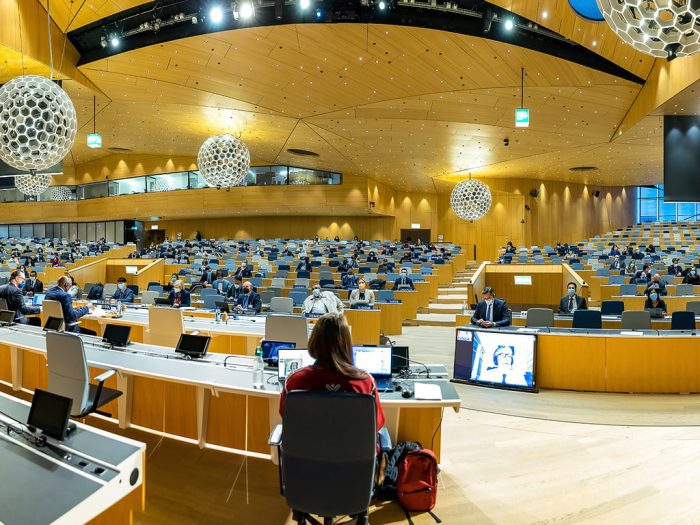
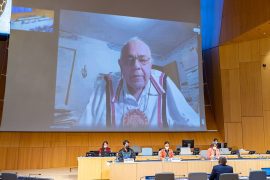
On behalf of NCAI, NARF participated in the WIPO session that took place in Geneva, Switzerland, from May 30 through June 3, 2022. The Indigenous Caucus at the session comprised around a dozen Indigenous representatives.
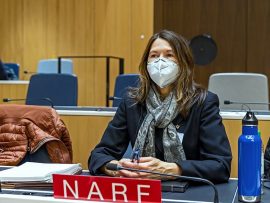
On behalf of NCAI, NARF Staff Attorney Sue Noe joined fellow advocates urging for the protection of Native peoples’ intellectual property rights through a new international legal instrument in negotiation among the 193 participating governments, including the United States. “The negotiations at WIPO are just one prong of Native peoples’ ongoing struggle to secure legal protections for their cultural heritage, in this case intangible cultural heritage in the form of traditional knowledge, like plant and medicinal knowledge, and traditional cultural expressions, such as songs, dances, ceremonies, and stories,” said Noe. “As recognized in the UN Declaration on the Rights of Indigenous Peoples, Indigenous Peoples have the right to maintain, control, protect, and develop their cultural heritage, traditional knowledge, and traditional cultural expressions, as well as their intellectual property rights over the same. And the countries who are members of WIPO have the obligation to ensure that these rights are fulfilled.”
2023
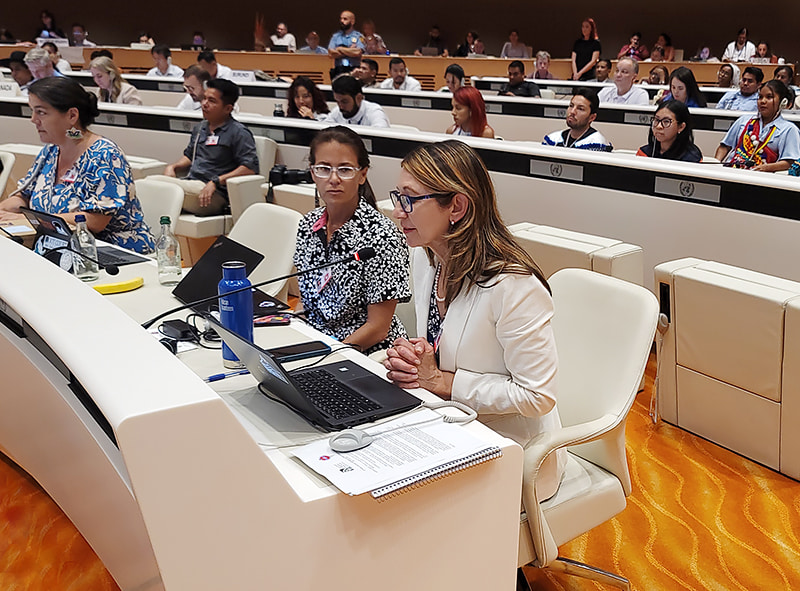
To ensure Tribal governments can protect their traditional medicinal knowledge and other traditional knowledge associated with the use of genetic resources, the Native American Rights Fund (NARF) advocated at United Nations proceedings this summer. Alongside Indigenous advocates from around the globe, NARF helped gain participation for Tribal governments in international intellectual property lawmaking.
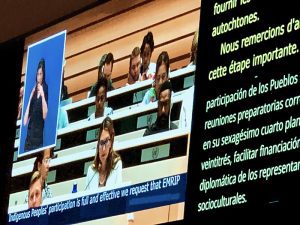
NARF advocated on behalf of the National Congress of American Indians for inclusion and funding for Native representatives to participate in the 2024 Diplomatic Conference to Conclude an International Legal Instrument for the Protection of Genetic Resources and Associated Traditional Knowledge. On July 14, 2023, the World Intellectual Property Organization member states voted to fund participation of 14 Indigenous representatives. As a result, two Indigenous representatives from each of seven sociocultural regions, including North America, will receive funding that will allow their participation in these international lawmaking negotiations in 2024.
The parameters of Indigenous participation in the Diplomatic Conference were discussed in a Preparatory Committee meeting on September 11-13, 2023. NARF represented NCAI at the Preparatory Committee meeting and continued to advocate within the World Intellectual Property Organization and other UN mechanisms for Indigenous Peoples’ participation.
2024
After more than 20 years, USPTO finally initiated formal Tribal consultation on the WIPO negotiations in October 2023. NARF represented NCAI in the webinar portion of the consultation on January 19 and 23, 2024, and prepared written
comments that were submitted February 23, 2024.
NCAI also delivered an intervention at the UN Permanent Forum on Indigenous Issues April 2024 session requesting a recommendation for ensuring effective Indigenous participation in the Diplomatic Conference on Genetic Resources that took place in May. Subsequently NARF represented NCAI in the negotiations at the
Diplomatic Conference. The Diplomatic Conference saw the historic adoption of a treaty that includes provisions for IndigenousPeoples, such as the disclosure of genetic resources and associated traditional knowledge in patent applications. The U.S. has not yet signed the treaty.
NCAI prepared positions on the WIPO Design Law Treaty to be discussed at the Diplomatic Conference in Saudi Arabia (November 2024), focusing on disclosure of traditional knowledge and the control of Indigenous designs in
publicly accessible databases. At that conference, WIPO adopted a new Design Law Treaty to harmonize and streamline applications for intellectual property protections for industrial designs. Although not able to attend the diplomatic conference due to its location in Saudi Arabia, NARF/NCAI advocated with the U.S. and other WIPO Member States to ensure the treaty would allow for nation state parties to require design applicants to disclose when designs are based on traditional knowledge or traditional cultural expressions.
NARF also represented NCAI in various session to discuss the GRATK Treaty Diplomatic Conference and negotiate on the TK and TCEs texts.
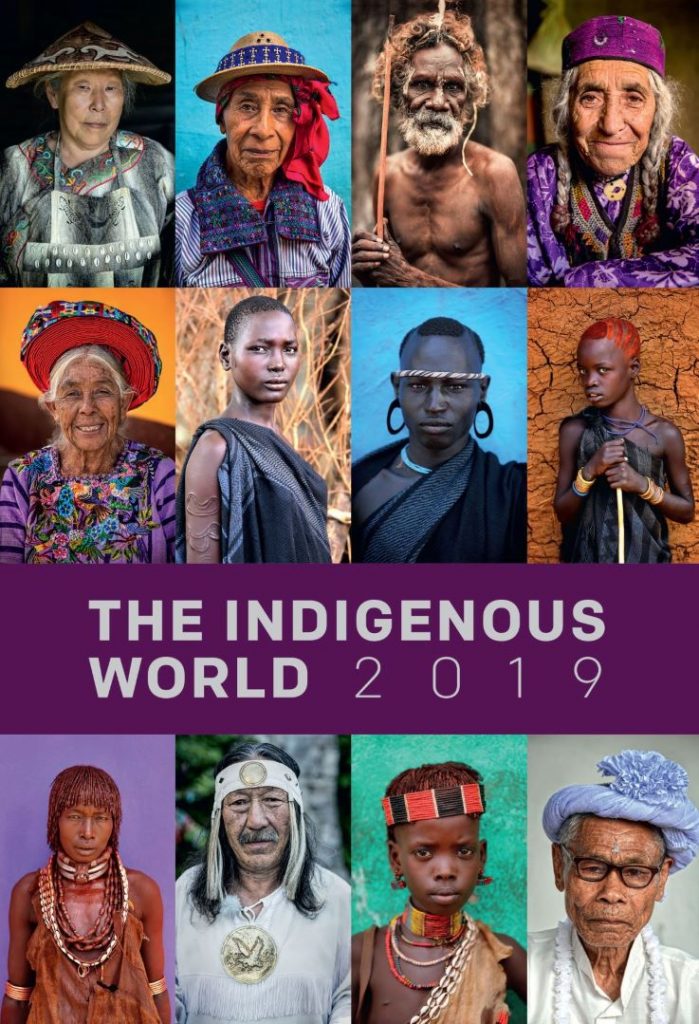
Learn More
Articles by NARF Staff Attorney Sue Noe in the annual Indigenous World report explore the role of WIPO.


